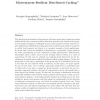Free Online Productivity Tools
i2Speak
i2Symbol
i2OCR
iTex2Img
iWeb2Print
iWeb2Shot
i2Type
iPdf2Split
iPdf2Merge
i2Bopomofo
i2Arabic
i2Style
i2Image
i2PDF
iLatex2Rtf
Sci2ools
98
Voted
CN
2007
2007
Mistreatment-resilient distributed caching
The distributed partitioning of autonomous, self-aware nodes into cooperative groups, within which scarce resources could be effectively shared for the benefit of the group, is increasingly emerging as a hallmark of many newly-proposed overlay and peer-topeer applications. Distributed caching protocols in which group members cooperate to satisfy local requests for objects is a canonical example of such applications. In recent work of ours we identified mistreatment as a potentially serious problem for nodes participating in such cooperative caching arrangements. Mistreatment materializes when a node’s access cost for fetching objects worsens as a result of cooperation. To that end, we outlined an emulation-based framework for the development of mistreatment-resilient distributed selfish caching schemes. Under this framework, a node opts to participate in the group only if its individual access cost is less than the one achieved while in isolation. In this paper, we argue against...
Access Cost | Caching | CN 2007 | Cooperative Group |
Related Content
| Added | 12 Dec 2010 |
| Updated | 12 Dec 2010 |
| Type | Journal |
| Year | 2007 |
| Where | CN |
| Authors | Georgios Smaragdakis, Nikolaos Laoutaris, Azer Bestavros, Ibrahim Matta, Ioannis Stavrakakis |
Comments (0)

